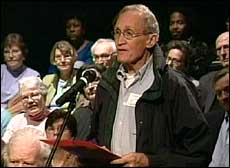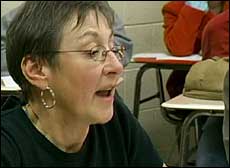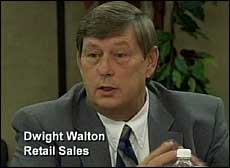
|
 |
By the People: Citizens Voices
Fifteen By the People citizen deliberations on two critically important
issues before the nation-healthcare and education-were the centerpiece
of a PBS national program on November 10, 2005. The television broadcast
covered more than 1,000 Americans at forums hosted across the country
during Deliberation Week-- October 22-29, 2005-- by local PBS stations
and their civic partners. It was produced by MacNeil/Lehrer Productions
and anchored by Ray Suarez, senior correspondent for The NewsHour with
Jim Lehrer.
Uninsured Americans
 On
any given day, 45 million Americans are without health insurance. One
of those citizens is recent college graduate Molly Blancett of Seattle.
Blancett's main employer doesn't give her benefits, so she works an extra
20 hours per week at Starbucks to get health insurance. "As unrealistic
as it sounds," says Blancett, "it makes me sad that your health
really depends on how much money you have in this country." On
any given day, 45 million Americans are without health insurance. One
of those citizens is recent college graduate Molly Blancett of Seattle.
Blancett's main employer doesn't give her benefits, so she works an extra
20 hours per week at Starbucks to get health insurance. "As unrealistic
as it sounds," says Blancett, "it makes me sad that your health
really depends on how much money you have in this country."
Government Responsibility for Healthcare
Many of the participants considered whether the government, individuals,
or businesses should be most responsible for fixing problems in our healthcare
system.  At
the Baton Rouge dialogue, financial advisor Ann Singleton commented, "I
think the worst thing in the world would be to have a government controlled
system. I don't think the government is capable of doing anything efficiently….We
can use Katrina and the aftermath here as a prime example." At
the Baton Rouge dialogue, financial advisor Ann Singleton commented, "I
think the worst thing in the world would be to have a government controlled
system. I don't think the government is capable of doing anything efficiently….We
can use Katrina and the aftermath here as a prime example."
Melvin Riley, an attorney, had another view: "Government is really
not the boogieman in this thing. It's how it's implemented."
Citizens Question Healthcare Experts
Helping participants better understand the issues were panels of experts
from each local community. In Charlottesville, retired state employee
Vernon Smith wasn't satisfied with the response he got from Ruth Hanft,
a health policy expert. "That really, really didn't answer my question.
My question is why do we, in our guilt, think that we have to provide
everybody with free healthcare?"
Hanft answered: "It's not free healthcare. "You pay for the
insurance premiums. You pay a payroll tax on Medicare."
"Why should we have some kind of socialized medicine to help those
that don't help themselves?" Smith responded.
Wellness and Preventative Healthcare
 Participants
in San Diego, Seattle, and Detroit talked about how wellness and preventative
care factor into the healthcare debate. "Healthcare should be a right,
and healthy or wellness-oriented lifestyles should be everyone's personal
responsibility," said Kathy Fenske of Detroit. Participants
in San Diego, Seattle, and Detroit talked about how wellness and preventative
care factor into the healthcare debate. "Healthcare should be a right,
and healthy or wellness-oriented lifestyles should be everyone's personal
responsibility," said Kathy Fenske of Detroit.
"Starting at home is essential," said Anthony Perry of Henry
Ford Community College, "but we also need leadership to tell us and
to advocate that, too."
Listen
to the entire healthcare section of the program in RealAudio.
Education: Funding and Taxes
Education issues including standards, testing, funding and parental involvement
were hot topics of discussion at a number of By the People events. When
it came to funding public schools, many participants were willing to consider
increased taxes.
 "I'm
probably one of the few people who's willing to pay more money to keep
the education standards at the highest level possible, even though I hate
my tax statement," said Dwight Walton of Kearney, Nebraska. Walton
felt we needed to increase funding to "keep our country top-notch
in global positioning." "I'm
probably one of the few people who's willing to pay more money to keep
the education standards at the highest level possible, even though I hate
my tax statement," said Dwight Walton of Kearney, Nebraska. Walton
felt we needed to increase funding to "keep our country top-notch
in global positioning."
Kari Mulroney, an accountant in Kearney, was skeptical: "I want
to see increased standards for the increase…if (my tax bill) is gonna
go up, I want to see the results."
Listen
to the education section of the program in RealAudio.
Citizens Reflect on the By the People Experience
Most Deliberation Week participants felt more engaged after joining in
the dialogues. Jane Teply, a teacher from Kearney, remarked: "We
learned that we all do have a role to play and that we can have something
to say about issues like this and participate."
Rep. Rosa DeLauro, D-CT, observed the conversations in New Haven and
remarked, "Legislation should not be top down. We should engage the
public."
 And
Julie Linderman of Seattle said, "Hopefully, this can continue and
perhaps move into something more interactive, where we as community members
can be making more of a difference in the decision-making process." And
Julie Linderman of Seattle said, "Hopefully, this can continue and
perhaps move into something more interactive, where we as community members
can be making more of a difference in the decision-making process."
Listen
to participants discuss their experience in Real Audio.
A Closing Conversation About National Priorities
Ray Suarez led a closing roundtable discussion on the nation's values
and priorities in healthcare and education. The discussion featured Dr.
Benjamin S. Carson, Sr., director of pediatric neurosurgery at the Johns
Hopkins Children's Center, who is widely known for his work separating
craniopagus twins around the world; Timothy Knowles, Executive Director
of the Center for Urban School Improvement at the University of Chicago;
Ruth Faden, co-author of the forthcoming book: "Social Justice: The
Moral Foundations of Public Health and Health Policy"; and Jennifer
Marshall, director of domestic policy studies at The Heritage Foundation.
Listen
to this section in Real Audio.
By the People's PBS Deliberation Week 2005 partners included:
Albuquerque, NM: KNME
Baton Rouge, LA: Louisiana Public Broadcasting
Bowling Green, OH: WBGU
Charlottesville, VA: WHTJ
Cleveland, OH: WVIZ/PBS Ideastream
Detroit, MI: WTVS-Detroit Public TV
Kansas City, MO: KCPT
Kearney, NE: NET Television
Miami, FL: WPBT
(Miami had to withdraw from the national broadcast because of Hurricane
Wilma. Their rescheduled event took place in January 2006, and was featured
on a local WPBT broadcast.)
Muncie, IN: WIPB
New Haven, CT: Connecticut PTV
Pittsburgh, PA: WQED Multimedia
Rochester, NY: WXXI
St. Louis, MO: KETC Channel 9
San Diego, CA: KPBS
Seattle, WA: KCTS Television
|
 |








